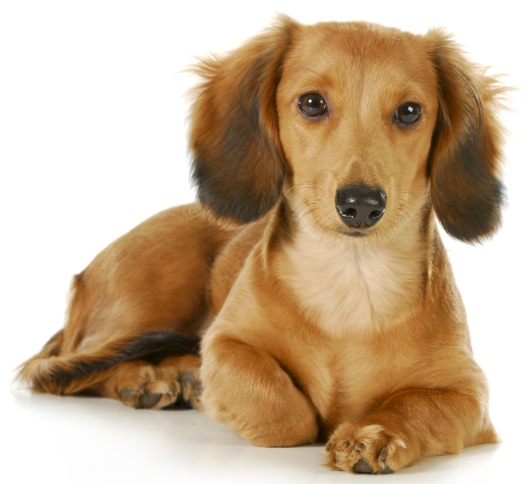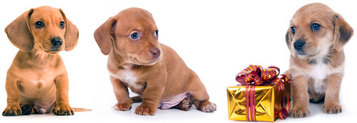Dachshunds need a special diet to maintain a healthy weight, which for this breed is critical because of their body shape. When you get your dachshund, you should always go to the vet and get a checkup right away. While you are there, you should discuss what type of food your dachshund will be eating.
For your Dachshund Puppies:
Feeding is most important to ensure healthy Miniature Dachshund development; it begins early when the puppy is weaned and continues throughout its life. Food plays an integral part of its muscle and bone development. When purchasing a puppy, it is important to know what type of food the puppy was eating; any sudden changes in diet can cause digestive problems.
To change its food to another well-balanced diet, do so gradually and begin by mixing small portions of the new food with the one being replaced, until it is completely switched over. Remember to do this gradually, over a period of seven to ten days.
The amount of food that a dog eats and the number of times per day that a dog is fed changes as it matures, for puppies, they should be fed small portions more frequently — usually four times a day until it reaches three months of age. Between the ages of three to six months, give the puppy three meals a day, the portions being slightly larger than before. After six months, there should be two meals a day; and at one year of age, there should be only one meal.
Feeding is most important to ensure healthy Miniature Dachshund development; it begins early when the puppy is weaned and continues throughout its life. Food plays an integral part of its muscle and bone development. When purchasing a puppy, it is important to know what type of food the puppy was eating; any sudden changes in diet can cause digestive problems.
To change its food to another well-balanced diet, do so gradually and begin by mixing small portions of the new food with the one being replaced, until it is completely switched over. Remember to do this gradually, over a period of seven to ten days.
The amount of food that a dog eats and the number of times per day that a dog is fed changes as it matures, for puppies, they should be fed small portions more frequently — usually four times a day until it reaches three months of age. Between the ages of three to six months, give the puppy three meals a day, the portions being slightly larger than before. After six months, there should be two meals a day; and at one year of age, there should be only one meal.
For your Adult Dachshunds:
It's important to keep in mind that it does not need to be given as much food; obesity can be a problem if not monitored closely. When your dog is a year old, you may decide to feed it in the evenings when your family has its meal. The dog's meal can also be divided into two smaller portions, one given in the morning and one at night. Never over-feed your dog; since it will not turn down food, it's up to you to monitor its eating habits and provide a reasonable amount. Remember to keep a bowl of fresh clean water near your dog's food bowl at all times.
In order to develop good eating habits, allow your dog its own dining area. Feeding times should be at the same time and in the same place everyday. Your dog's food and water should be served at room temperature so that the food is neither too hot nor too cold. Snack foods such as cake, chocolate, and other junk foods are not for dogs and should never be given to them. Other unhealthy foods include spicy, fried, starchy or fatty foods. Chicken, pork, and fish bones are very dangerous to a dog if eaten since they can cause intestinal damage and tear the stomach lining.
If your Miniature Dachshund becomes pregnant or sick, the nutritional needs will change. Consult with your veterinarian to make the proper dietary adjustments; vitamin and mineral supplements can also be given. It is very important to keep your dog's feeding and watering dishes clean on a daily basis. Once the dog has finished it meal, throw away any uneaten food and clean the dishes. They should be washed using hot water and soap, and then rinsed and dried, just like us, they should be eating on clean, bacteria free dishes and drinking fresh water.
It's important to keep in mind that it does not need to be given as much food; obesity can be a problem if not monitored closely. When your dog is a year old, you may decide to feed it in the evenings when your family has its meal. The dog's meal can also be divided into two smaller portions, one given in the morning and one at night. Never over-feed your dog; since it will not turn down food, it's up to you to monitor its eating habits and provide a reasonable amount. Remember to keep a bowl of fresh clean water near your dog's food bowl at all times.
In order to develop good eating habits, allow your dog its own dining area. Feeding times should be at the same time and in the same place everyday. Your dog's food and water should be served at room temperature so that the food is neither too hot nor too cold. Snack foods such as cake, chocolate, and other junk foods are not for dogs and should never be given to them. Other unhealthy foods include spicy, fried, starchy or fatty foods. Chicken, pork, and fish bones are very dangerous to a dog if eaten since they can cause intestinal damage and tear the stomach lining.
If your Miniature Dachshund becomes pregnant or sick, the nutritional needs will change. Consult with your veterinarian to make the proper dietary adjustments; vitamin and mineral supplements can also be given. It is very important to keep your dog's feeding and watering dishes clean on a daily basis. Once the dog has finished it meal, throw away any uneaten food and clean the dishes. They should be washed using hot water and soap, and then rinsed and dried, just like us, they should be eating on clean, bacteria free dishes and drinking fresh water.
Consider commercial brands. After your discussion with your veterinarian, when you decide to get a commercial brand of food, choose carefully. Of the many brands out there, some are very good, and others are very bad.
Buyer Beware: Brands of dog food at grocery stores usually have a high fat content, high sodium content, preservatives and artificial flavors. You might consider purchasing your dog food online from a trusted website or from your local pet supply and specialty store.
Which brand to choose? Ask your veterinarian, select a high-quality brand, and make sure it has no animal byproducts or artificial flavoring — steer clear of foods with corn and soy. Look at the nutrition label, if the first and main ingredient isn't meat, keep looking.
Some brands for your consideration:
Know of any other great brands? Let us know and we'll post it!
Buyer Beware: Brands of dog food at grocery stores usually have a high fat content, high sodium content, preservatives and artificial flavors. You might consider purchasing your dog food online from a trusted website or from your local pet supply and specialty store.
Which brand to choose? Ask your veterinarian, select a high-quality brand, and make sure it has no animal byproducts or artificial flavoring — steer clear of foods with corn and soy. Look at the nutrition label, if the first and main ingredient isn't meat, keep looking.
Some brands for your consideration:
- Fromm
- Blue Buffalo
- Organix
- The Honest Kitchen
- Dick Van Pattern's Natural Balance
- Eukanuba Dachshund Formula
Know of any other great brands? Let us know and we'll post it!


 RSS Feed
RSS Feed
